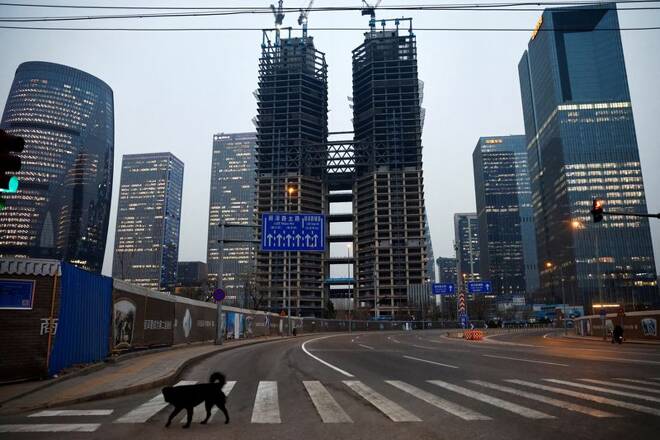Advertisement
Advertisement
China’s economy gathers speed, global risks raise challenges to outlook
By:
By Kevin Yao BEIJING (Reuters) - China's gross domestic product likely gathered pace in the first quarter, data is expected to show on Tuesday, as the end of strict COVID curbs lifted the world's second-largest economy out of a crippling pandemic slump, although some headwinds persist.
By Kevin Yao and Joe Cash
BEIJING (Reuters) – China’s economy grew at a faster-than-expected pace in the first quarter, as the end of strict COVID curbs lifted businesses and consumers out of crippling pandemic disruptions, although headwinds from a global slowdown point to a bumpy ride ahead.
More than a year-long sweeping streak of global monetary policy tightening to rein in red-hot inflation has dented world economic growth, leaving many countries including China reliant on domestic demand to spur momentum and raising the challenge for policymakers looking for post-COVID stability.
Gross domestic product grew 4.5% year-on-year in the first three months of the year, data from the National Bureau of Statistics (NBS) showed on Tuesday, faster than the 2.9% in the previous quarter. It beat analyst forecasts for a 4.0% expansion and marked the strongest growth in a year.

Investors have been closely watching first quarter data to assess the strength of the recovery after Beijing abruptly lifted COVID curbs in December and eased a three-year crackdown on tech firms and property. GDP growth last year slumped to one of its worst in nearly half a century due to COVID restrictions.
“Economic recovery is well on track. The bright spot is consumption, which is strengthening as household confidence improves,” said Zhiwei Zhang, chief economist at Pinpoint Asset Management. “The strong export growth in March also likely helped to boost GDP growth in Q1.”
Chinese policymakers have pledged to step up support for the $18 trillion economy to keep a lid on unemployment, but they face limited room to manoeuvre as businesses grapple with debt risks, structural woes and global recession worries.
China’s rebound has so far remained uneven as its investment-fuelled growth of the past to one now reliant on consumption faces challenges.
Consumption, services and infrastructure spending have perked up but factory output has lagged amid weak global growth, while slowing prices and surging bank savings are raising doubts about demand.
China’s exports unexpectedly surged in March, but analysts cautioned the improvement partly reflects suppliers catching up with unfulfilled orders after the COVID-19 disruptions.
NBS spokesman Fu Linghui told a news conference that while it was a good start for the economy, “the international environment is still complex and ever-changing, constraints from insufficient domestic demand are obvious and the foundation for economic recovery is not solid.”
China’s second-quarter growth could pick up sharply due to the year-ago low base effect, Fu said.
On a quarter-on-quarter basis, GDP grew 2.2% in January-March, meeting analyst expectations and up from a revised 0.6% rise in the previous quarter.
Asian shares weakened as a brief post-data lift was eclipsed by signs a full-blown recovery in China was still some way off. China’s bluechip CSI300 Index was up just 0.3%.
Modest growth target
Analysts polled by Reuters expect China’s growth in 2023 to speed up to 5.4%, from 3.0% last year.
The government has set a modest GDP growth target of around 5% for this year, after badly missing the 2022 goal.
Separate data on March activity on Tuesday showed retail sales growth quickened to 10.6%, beating expectations and hitting near two-year highs. But that was led by a low-base effect and there are signs of caution among consumers.
Factory output growth also sped up but was just below expectations.
“Riding on this trend, we expect GDP in the second quarter to reach around 8%, and it won’t be a big problem for China to achieve its growth target for the year,” said Tao Chuan, chief macro analyst at Soochow Securities in Beijing.
“That said, we see some structural problems remain in unemployment rate, property investment and confidence in private sector. These problems need to be solved to support a sustained recovery.”
China’s nationwide survey-based jobless rate fell to 5.3% in March from 5.6% in February, but the jobless rate for those aged 16 to 24 rebounded to 19.6% last month from 18.1% in February.

China’s infrastructure investment rose 8.8% in January-March year-on-year – outpacing a 5.1 rise in overall fixed-asset investment, while property investment fell 5.8%.
Policy support
The nation’s central bank, which cut lenders’ reserve requirement ratio in March, said last week it will maintain ample liquidity, stabilise growth and jobs.
On Monday, the central bank extended liquidity support to banks through its medium-term lending facility but kept the rate on such loans unchanged, an indication Beijing isn’t overly concerned about the immediate growth outlook.
The government, which has refrained from taking big steps to spur consumption, is still relying heavily on infrastructure spending to spur investment and economic growth.
“In short, with this GDP report, we believe there is no immediate need for the government to put massive stimulus into the economy,” Iris Pang, chief Greater China economist at ING, said in a note.($1 = 6.8761 Chinese yuan)
(Additional reporting by Ellen Zhang and Liangping Gao; Editing by Sam Holmes and Shri Navaratnam)
About the Author
Reuterscontributor
Reuters, the news and media division of Thomson Reuters, is the world’s largest international multimedia news provider reaching more than one billion people every day. Reuters provides trusted business, financial, national, and international news to professionals via Thomson Reuters desktops, the world's media organizations, and directly to consumers at Reuters.com and via Reuters TV. Learn more about Thomson Reuters products:
Did you find this article useful?
Latest news and analysis
Advertisement
